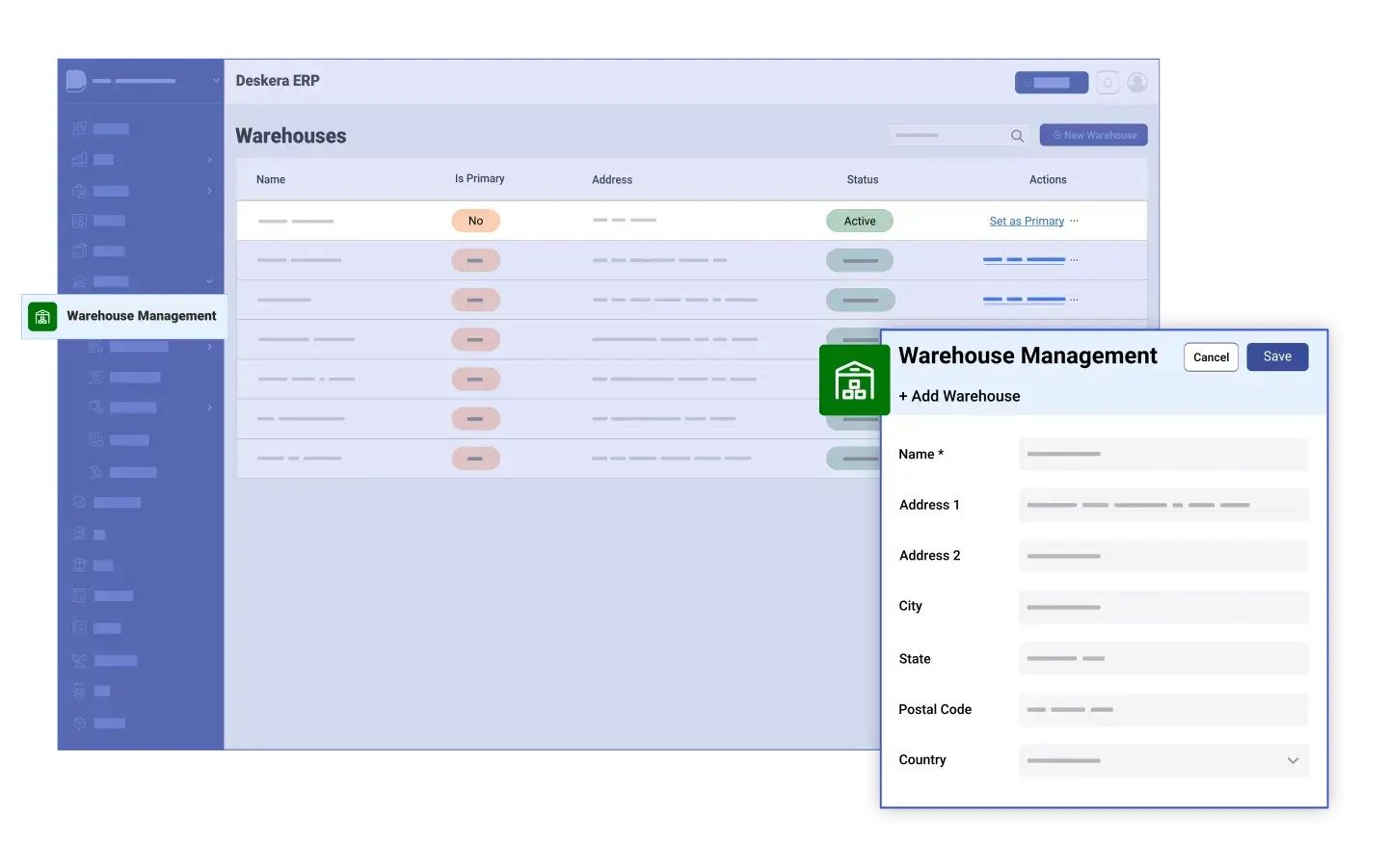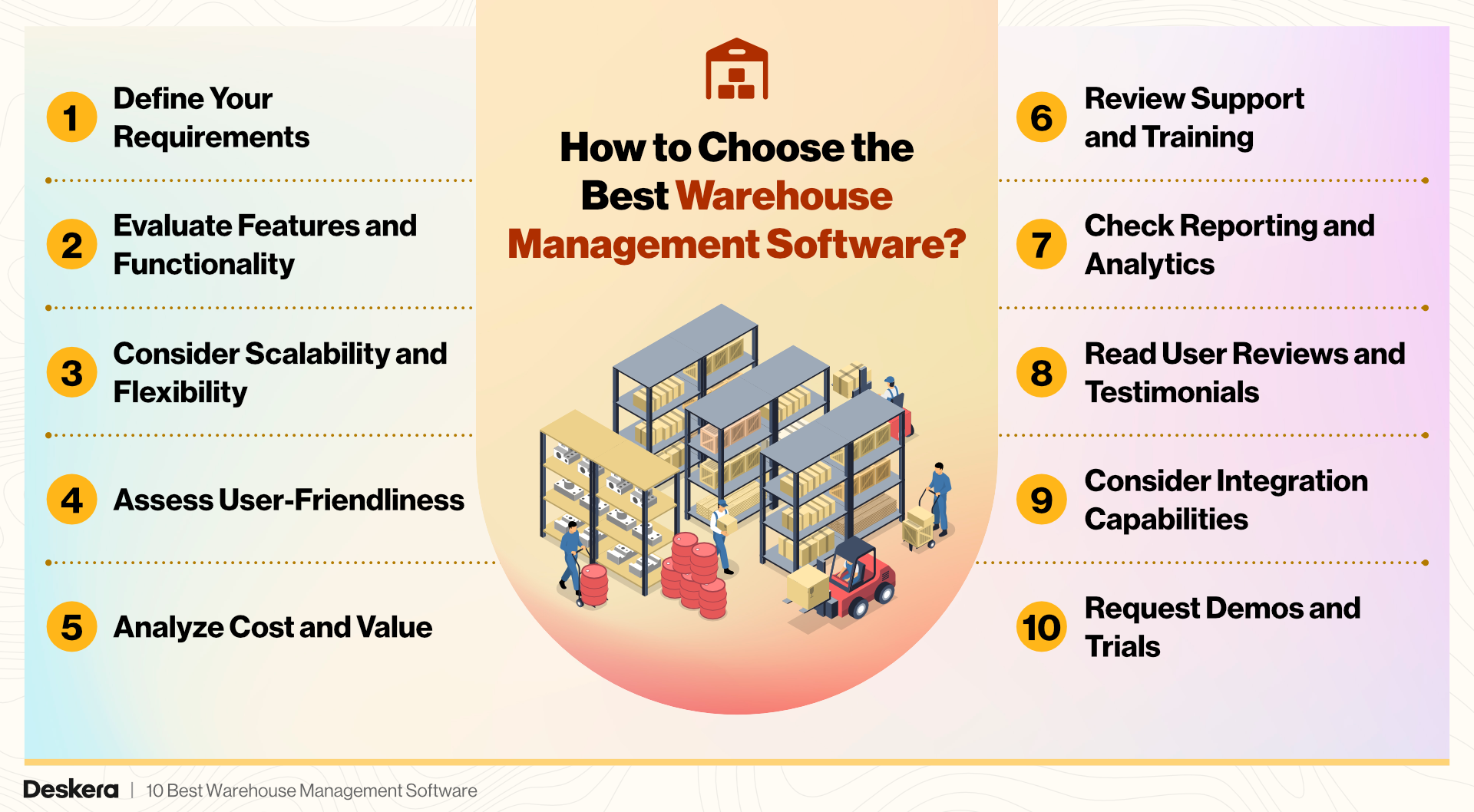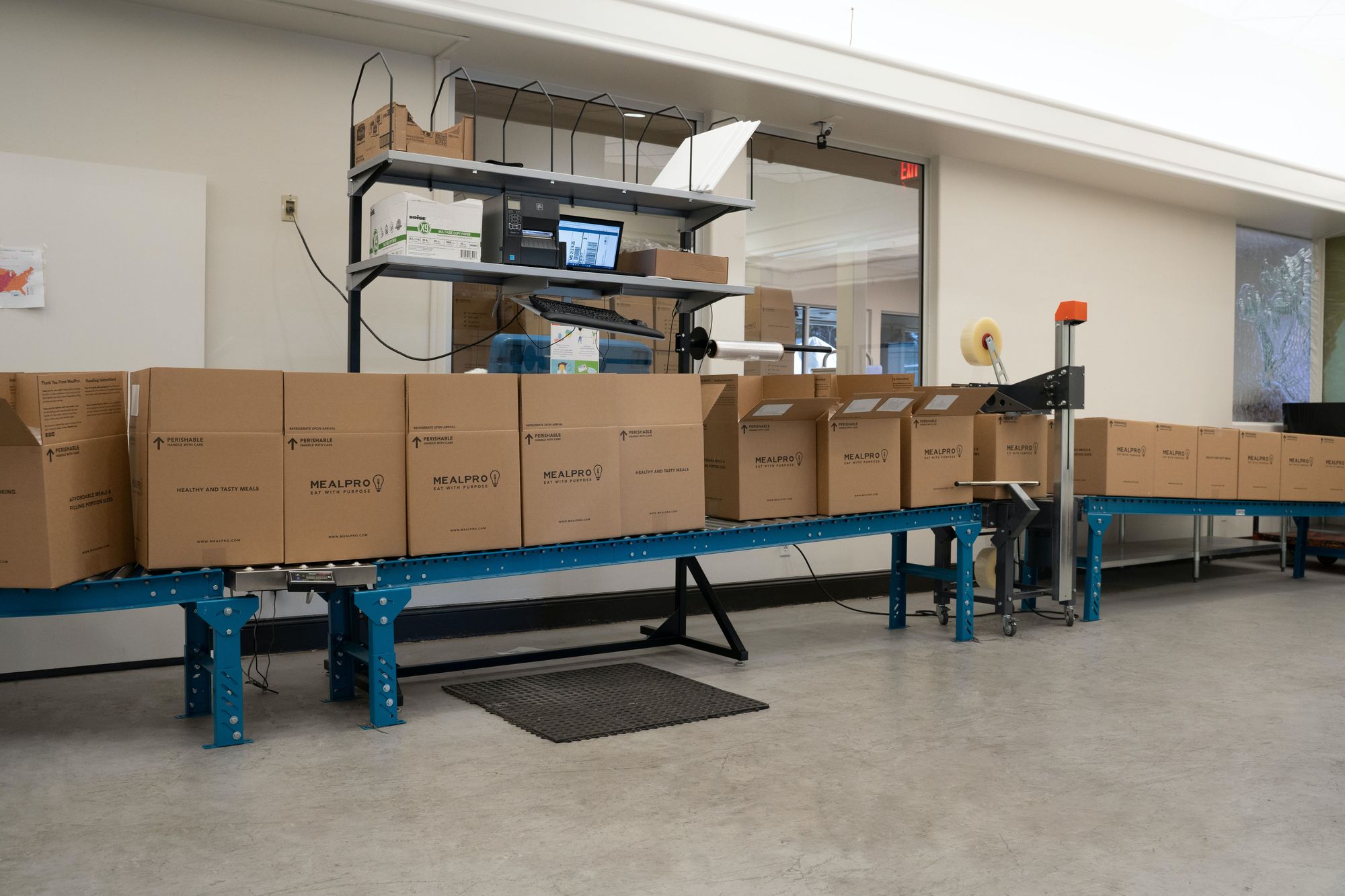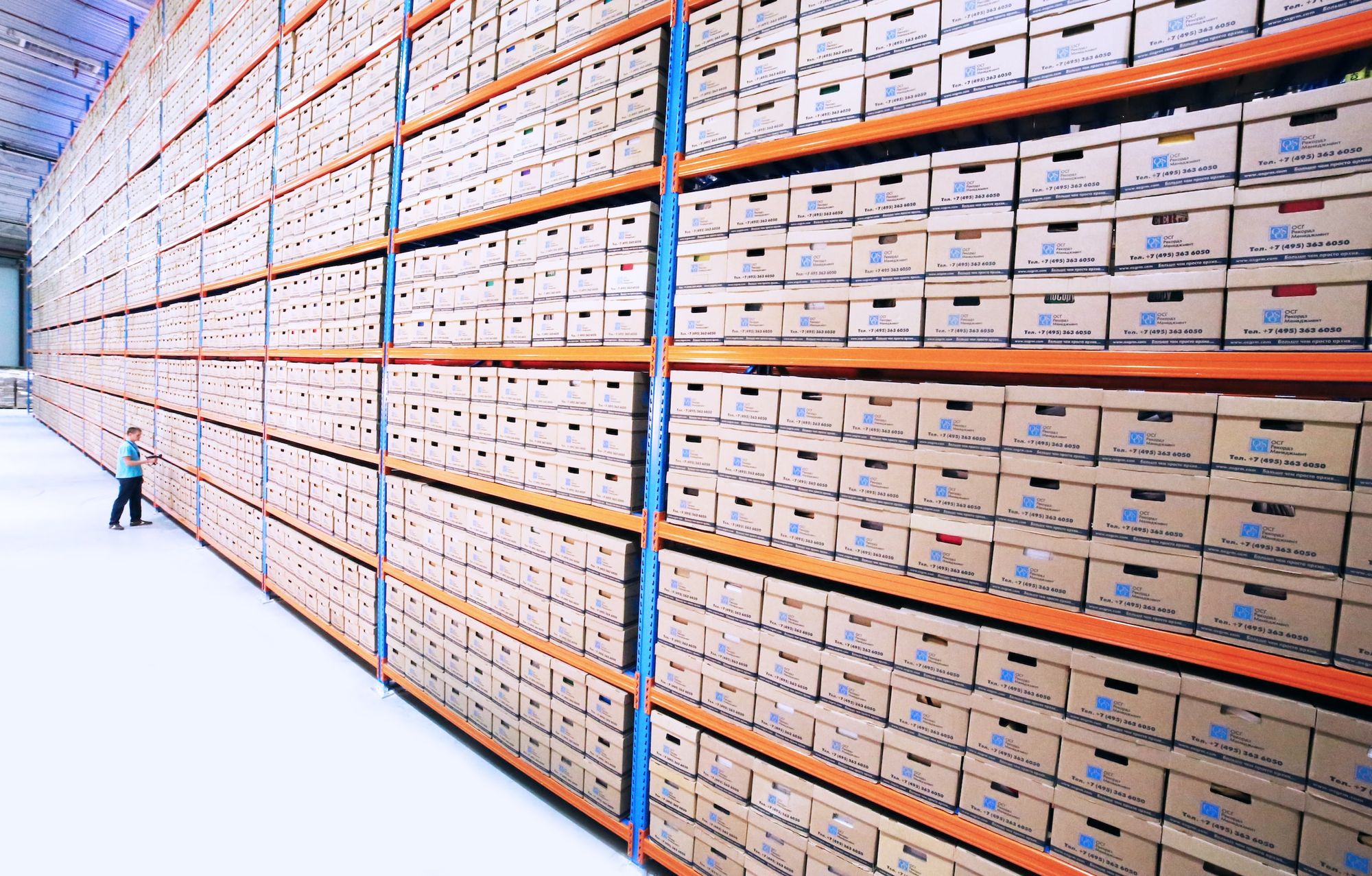Are you struggling to keep your warehouse operations running smoothly and efficiently? With the ever-increasing complexity of modern supply chains, coupled with the high expectations for timely deliveries and accurate inventory management, it's crucial to have a robust system in place.
Warehouse Management Software (WMS) has emerged as an indispensable tool for businesses of all sizes, offering comprehensive solutions to manage inventory, track shipments, optimize workflows, and ensure regulatory compliance.
Effective warehouse management can significantly impact your bottom line, reducing costs associated with overstocking, stockouts, and manual errors.
Furthermore, a well-implemented WMS can improve customer satisfaction by ensuring that orders are fulfilled accurately and promptly. However, with the plethora of WMS options available in the market, selecting the right one for your specific needs can be daunting.
In this article, we will delve into the ten best warehouse management software solutions available today. Each of these options has been carefully evaluated based on their features, user-friendliness, scalability, and ability to integrate with other systems.
Whether you operate a small business seeking to enhance operational efficiency or a large enterprise aiming to maintain a competitive edge, these WMS solutions offer the tools necessary to achieve greater control and efficiency in your warehouse operations.
Among these, Deskera ERP stands out with its comprehensive suite of warehouse management features, including real-time inventory tracking and multi-warehouse support, making it an ideal choice for streamlined operations.
Join us as we explore the capabilities and benefits of each software, helping you make an informed decision for your business's success.
What is Warehouse Management Software?
Warehouse Management Software (WMS) is a specialized application designed to support and optimize warehouse operations and distribution center management. It plays a crucial role in ensuring efficient and accurate handling of inventory, from the moment it enters the warehouse until it is shipped to the end customer.
Here are some of the key functions and features of WMS:
- Inventory Management: Tracks and manages inventory levels, locations, and movements within the warehouse. This helps in maintaining optimal stock levels, preventing overstocking and stockouts, and ensuring inventory accuracy.
- Order Fulfillment: Manages the process of picking, packing, and shipping orders. WMS helps in streamlining these processes to ensure timely and accurate order fulfillment, enhancing customer satisfaction.
- Receiving and Putaway: Handles the receiving of goods into the warehouse and their subsequent storage in appropriate locations. This ensures that inventory is stored efficiently and can be easily located when needed.
- Labor Management: Tracks and optimizes the performance of warehouse staff. This includes assigning tasks, monitoring productivity, and ensuring that labor resources are used effectively.
- Shipping Management: Manages the outbound logistics, including carrier selection, shipping documentation, and tracking of shipments. This ensures that orders are shipped accurately and cost-effectively.
- Reporting and Analytics: Provides insights into warehouse operations through various reports and analytics. This helps in identifying trends, pinpointing inefficiencies, and making data-driven decisions to improve warehouse performance.
- Integration with Other Systems: WMS often integrates with other business systems such as Enterprise Resource Planning (ERP) and Transportation Management Systems (TMS), providing a seamless flow of information across the supply chain.
By implementing a robust WMS, businesses can achieve greater visibility and control over their warehouse operations, leading to increased efficiency, reduced costs, and improved customer satisfaction.
Warehouse Management System in Logistics
In the logistics sector, an effective warehouse management system (WMS) is crucial for optimizing the flow of goods and ensuring operational efficiency.
A warehouse management system in logistics provides the tools needed to manage complex inventory requirements, streamline processes, and improve overall supply chain performance.
The key features and benefits of warehouse management system in logistics are:
1. Real-Time Inventory Tracking
A robust WMS for logistics offers real-time visibility into inventory levels, locations, and movements. This capability helps prevent stockouts and overstock situations, ensuring that the right products are available when needed and reducing holding costs.
2. Efficient Order Fulfillment
Logistics operations rely heavily on accurate and timely order fulfillment. Advanced warehouse management software enhances picking, packing, and shipping processes, enabling faster order processing and reducing errors. This leads to improved customer satisfaction and more efficient supply chain operations.
3. Multi-Warehouse Management
For logistics companies with multiple distribution centers, a warehouse management system in logistics provides the functionality to manage and coordinate activities across various locations. This ensures a unified approach to inventory management and streamlines cross-warehouse transfers.
4. Integration with Supply Chain Systems
A WMS integrated with other supply chain systems, such as transportation management and enterprise resource planning (ERP) software, enhances overall operational efficiency. Seamless integration allows for better coordination between warehouse activities and other logistics functions, such as procurement and distribution.
5. Advanced Reporting and Analytics
Effective warehouse management software in logistics includes comprehensive reporting and analytics capabilities. These tools provide insights into warehouse performance, identify bottlenecks, and support data-driven decision-making. By analyzing key metrics, logistics companies can continuously improve their processes and optimize resource allocation.
6. Automation and Robotics
Many modern warehouse management systems incorporate automation and robotics to handle repetitive tasks and enhance efficiency. Technologies such as automated picking systems, conveyor belts, and robotic process automation reduce manual labor and improve accuracy in warehouse operations.
Choosing the Right WMS for Logistics
Selecting the ideal warehouse management system (WMS) for logistics is a critical decision that can significantly impact the efficiency and effectiveness of your supply chain operations.
Here are key factors to consider when choosing a WMS tailored for logistics:
1. Scalability
Scalability is a fundamental consideration when choosing a WMS for logistics. As your business grows and your logistics operations become more complex, your warehouse management software must be able to scale accordingly.
Look for a WMS that can handle increasing transaction volumes, additional warehouses, and expanding inventory. Scalability ensures that the software remains effective and supports your business's growth without requiring a complete system overhaul.
2. Integration Capabilities
A WMS with strong integration capabilities is essential for seamless coordination across various business functions. Evaluate how well the WMS integrates with other critical systems such as Enterprise Resource Planning (ERP), Transportation Management Systems (TMS), and accounting software.
Effective integration streamlines data flow, reduces manual data entry, and ensures that all parts of your logistics operation work harmoniously. Integration with other logistics systems can enhance visibility and coordination across your supply chain.
3. Features Tailored to Logistics
Choosing a WMS with features specifically designed for the logistics industry can greatly enhance operational efficiency. Look for a system that offers:
- Multi-Warehouse Management: Ability to manage inventory across multiple locations, including tracking and optimizing stock levels at each site.
- Real-Time Inventory Tracking: Provides up-to-date visibility into inventory movements and stock levels, crucial for managing complex logistics operations.
- Order Fulfillment Optimization: Features to streamline picking, packing, and shipping processes, reducing lead times and improving accuracy.
- Automation and Robotics: Support for automated systems such as conveyor belts and robotic picking to enhance efficiency and reduce manual labor.
- Advanced Reporting and Analytics: Comprehensive reporting tools to analyze performance, track key metrics, and make data-driven decisions.
4. User-Friendliness
A WMS that is intuitive and easy to use will facilitate quicker adoption and minimize training time for your logistics team. Evaluate the user interface and overall ease of navigation to ensure that it aligns with the skills and experience of your staff. A user-friendly system reduces the likelihood of errors and improves operational efficiency.
5. Cost and ROI
Consider both the initial cost and the long-term return on investment (ROI) when selecting a WMS. Analyze the pricing structure, including upfront costs, subscription fees, and additional charges for support or extra features.
Weigh these costs against the potential benefits, such as improved efficiency, reduced operational costs, and enhanced customer service. A cost-effective solution that delivers significant ROI will be valuable in the long run.
6. Support and Training
Effective support and training are essential for successful implementation and ongoing use of a WMS. Ensure that the provider offers comprehensive training resources, including documentation, tutorials, and hands-on training sessions. Robust customer support is also crucial for resolving issues promptly and ensuring smooth operation of the system.
7. Customization and Flexibility
Evaluate the customization options available with the WMS. The ability to tailor the system to meet your specific logistics requirements can enhance its effectiveness.
Flexibility in configuration allows you to adapt the software to your unique processes and workflows, ensuring that it fits seamlessly into your existing operations.
8. Compliance and Security
Ensure that the WMS adheres to industry standards for compliance and security. The software should support regulatory requirements relevant to your logistics operations and provide robust security measures to protect sensitive data. Compliance with industry standards and protection of data are critical for maintaining operational integrity and customer trust.
Benefits of Warehouse Management Software
Implementing warehouse management software (WMS) offers numerous advantages for businesses, enhancing their operational efficiency and effectiveness.
Here are some key benefits of using warehouse management system software:
1. Improved Inventory Accuracy
One of the primary benefits of warehouse management software is the enhancement of inventory accuracy. By providing real-time tracking of inventory levels, locations, and movements, WMS reduces the risk of stock discrepancies and helps maintain accurate inventory records.
This is particularly important for a robust warehouse inventory management system that aims to prevent stockouts and overstock situations.
2. Efficient Order Fulfillment
A well-designed WMS streamlines the order fulfillment process, from picking and packing to shipping.
By optimizing these processes, warehouse management software increases order processing speed and accuracy, leading to improved customer satisfaction.
Efficient order fulfillment is a key feature of the best warehouse management systems, contributing to smoother and faster operations.
3. Enhanced Warehouse Space Utilization
Warehouse management systems help maximize space utilization by optimizing storage layouts and managing warehouse capacity effectively.
With features such as bin location management and automated replenishment, businesses can make better use of their warehouse space, which is crucial for managing multiple warehouses and increasing operational efficiency.
4. Real-Time Data and Analytics
Warehouse management software provides real-time data and advanced reporting capabilities, offering valuable insights into warehouse operations. This data helps identify inefficiencies, track performance metrics, and make informed decisions.
Advanced analytics features are essential for any comprehensive warehouse management system software, enabling continuous improvement and optimization.
5. Scalability and Flexibility
Modern warehouse management systems are designed to be scalable and flexible, accommodating the growing needs of businesses. Whether your company is expanding its operations or adding new warehouses, a good WMS can adapt to these changes, making it a suitable option for businesses looking for the best warehouse management system for small business and beyond.
6. Integration with Other Systems
Many warehouse management systems integrate seamlessly with other business systems, such as ERP and accounting software.
This integration ensures smooth coordination between warehouse operations and other functions, enhancing overall efficiency and accuracy across the supply chain.
7. Reduction in Operational Costs
By optimizing inventory management, order fulfillment, and warehouse space, WMS helps reduce operational costs.
Automation and improved efficiency lead to lower labor costs and fewer errors, making warehouse management software a cost-effective solution for businesses.
8. Enhanced Customer Service
With better inventory accuracy, faster order fulfillment, and real-time data, warehouse management software enhances overall customer service.
Reliable and timely delivery of orders improves customer satisfaction and loyalty, which is a significant benefit for any business looking to maintain a competitive edge.
9. Advanced Automation Capabilities
Many modern WMS solutions incorporate advanced automation technologies, such as robotics and automated picking systems.
These features reduce manual labor, increase accuracy, and speed up warehouse operations, providing a competitive advantage in the logistics sector.
10. Compliance and Security
Warehouse management software often includes features that support regulatory compliance and data security.
Ensuring compliance with industry standards and protecting sensitive information are critical for businesses managing complex warehouse operations.
How to Rank the Top Warehouse Management Software?
To rank the top warehouse management software, a thorough and systematic evaluation process is essential.
Here are the steps to effectively rank the best warehouse management software (WMS):
1. Define Evaluation Criteria
Establish a comprehensive set of criteria to evaluate each warehouse management system. Common criteria include:
- Features and Functionality: Assess the core features such as inventory management, order fulfillment, receiving and putaway, labor management, shipping management, and reporting and analytics.
- Ease of Use: Evaluate the user interface and overall user experience. A user-friendly warehouse management system is crucial for efficient operations.
- Scalability: Determine if the WMS can scale with your business as it grows, accommodating increased inventory and order volumes.
- Integration Capabilities: Check the ease of integration with other systems like ERP, TMS, and accounting software.
- Cost: Consider the cost-effectiveness of the warehouse management software, including upfront costs, subscription fees, and any additional expenses.
- Support and Training: Evaluate the availability and quality of customer support, training resources, and user communities.
- Customization: Assess the flexibility of the WMS to be customized to meet specific business needs.
2. Research and Shortlist
Compile a comprehensive list of warehouse management software options. Sources for this list can include industry reports, expert reviews, and user feedback.
3. Conduct Detailed Reviews
For each shortlisted warehouse management system, conduct detailed reviews based on the defined criteria. This involves:
- Feature Analysis: Compare the features of each WMS, focusing on their relevance and effectiveness in warehouse inventory management.
- User Reviews: Gather and analyze user reviews and testimonials to understand real-world experiences and satisfaction levels.
- Demo and Trials: Arrange for product demonstrations or take advantage of free trials to assess the software hands-on.
4. Score and Rank
Assign scores to each WMS based on the evaluation criteria. Use a weighted scoring system to prioritize the most critical factors. Calculate the overall score for each warehouse management system and rank them accordingly.
By following this structured approach, you can effectively rank and identify the best warehouse management software that meets the diverse needs of different businesses.
Whether you're looking for the best warehouse management system for a small business, a comprehensive warehouse inventory management system, or free warehouse management software, this process ensures that you make an informed decision based on thorough research and analysis.
10 Best Warehouse Management Software
The top 10 warehouse management software are:
Deskera ERP

In the ever-evolving landscape of warehouse operations, Deskera ERP stands out as a versatile and robust warehouse management software (WMS) solution.
Recognized among the best warehouse management software available, Deskera ERP integrates seamlessly into various business processes, offering a comprehensive suite of tools designed to streamline and optimize warehouse operations.
Features and Functionality
1. Inventory Management: Deskera ERP excels as a warehouse inventory management system, providing real-time visibility into inventory levels, locations, and movements. This ensures that businesses can maintain optimal stock levels, reduce the risk of overstocking or stockouts, and achieve accurate inventory counts.
2. Order Fulfillment: As one of the best warehouse inventory management software options, Deskera ERP simplifies the order fulfillment process. It automates the picking, packing, and shipping workflows, ensuring timely and accurate order deliveries, thereby enhancing customer satisfaction.
3. Receiving and Putaway: Deskera ERP’s warehouse management system software efficiently handles the receiving of goods and their subsequent storage. This feature ensures that inventory is organized systematically, making it easy to locate and retrieve items when needed.
4. Integration Capabilities: One of the key strengths of Deskera ERP is its ability to integrate with other business systems. This integration capability is crucial for creating a seamless flow of information across the supply chain, making Deskera ERP a preferred choice among WMS software companies.
5. Reporting and Analytics: Deskera ERP provides robust reporting and analytics tools that offer insights into various warehouse operations. These tools help businesses make data-driven decisions to improve efficiency and reduce operational costs.
6. Scalability and Customization: Deskera ERP is highly scalable, making it suitable for businesses of all sizes. Whether you are a small business looking for the best warehouse management system for small business or a large enterprise requiring advanced features, Deskera ERP can be customized to meet your specific needs. This flexibility ensures that the software grows with your business, adapting to changing requirements and expanding operations.
7. Cost-Effectiveness: While Deskera ERP is a comprehensive solution, it also offers cost-effective options, including versions that can serve as warehouse management software free for smaller businesses or startups. This makes it accessible to a wider range of companies, providing essential WMS features without a significant financial burden.
8. Support and Training: Deskera ERP offers excellent customer support and training resources, ensuring that users can effectively leverage the software’s capabilities. This support is crucial for businesses looking to implement a new warehouse management system and needing guidance during the transition.
Oracle NetSuite
Oracle NetSuite is a widely adopted warehouse management software, particularly favored by small and mid-sized businesses. With over 10,000 organizations globally relying on it, NetSuite stands out for its robust cloud-based and SaaS architecture, designed from the outset to operate in the cloud.
This foundational design offers a high degree of maturity and scalability, essential for businesses planning for growth.
However, there are some notable drawbacks. NetSuite's warehouse management system software may not be as effective for handling complex warehouse operations compared to some other options available.
Additionally, the implementation process can be challenging, and many users report dissatisfaction with the level of support provided during this phase, both from NetSuite and its resellers. These potential issues should be carefully weighed when considering NetSuite as your warehouse inventory management system.
To learn more about Deskera ERP vs. NetSuite, click here.
Microsoft Dynamics 365
Microsoft Dynamics 365 (D365) is a widely utilized enterprise technology, particularly noted for its comprehensive capabilities that extend beyond finance to include warehouse management software and supply chain solutions.
This system is well-suited for distribution companies, offering integrated features for eCommerce, order management, and other functions crucial to warehouse operations.
One of the standout advantages of D365 is its flexibility. Unlike some other warehouse management systems, D365 can be more easily tailored to meet specific business requirements.
This customization potential can be both an advantage and a challenge, depending on the complexity of the needed configurations. The system's familiar Microsoft interface also aids in user adoption and training, making it more intuitive for employees already accustomed to Microsoft products.
However, D365 does have its limitations. It may struggle with more intricate supply chain needs, and the network of resellers and implementation partners can be problematic.
Despite these challenges, D365 remains a viable option for many organizations, offering a balance of flexibility and functionality within the best warehouse management software solutions.
To learn more about Deskera ERP vs. Microsoft Dynamics 365, click here.
SAP Business One
SAP Business One is a versatile warehouse management software that caters to small and mid-sized businesses. Known for its robust capabilities, it provides a comprehensive solution to manage inventory, optimize warehouse operations, and integrate seamlessly with other business processes. This system is particularly well-suited for companies looking to scale their operations and improve efficiency across their supply chain.
SAP Business One offers a range of features designed to enhance warehouse management, such as real-time inventory tracking, order management, and advanced reporting. Its flexibility allows businesses to handle multiple warehouses and manage complex logistics operations effectively. This makes it one of the best warehouse inventory management software options available for growing companies.
On the flip side, SAP Business One can be relatively complex to implement and may require significant training for staff to use effectively. Additionally, the cost can be a consideration for smaller businesses, as the comprehensive functionality often comes with a higher price tag. Despite these challenges, SAP Business One remains a strong contender in the list of warehouse management software due to its powerful capabilities and scalability.
To learn more about Deskera ERP vs. SAP Business One, click here.
Fishbowl
Fishbowl is a popular warehouse management software solution widely used by small and mid-sized distribution companies. Known for its simplicity and ease of use, Fishbowl is also capable of meeting more complex needs as companies grow, such as handling multi-currency transactions and managing multiple warehouses. It is particularly favored by businesses that rely on ERP systems with limited warehouse management capabilities.
However, Fishbowl may not be scalable enough for the complex needs of larger organizations and extensive supply chains. A commonly cited drawback is its reporting capabilities, which can lack the depth and transparency found in other warehouse management system software solutions.
Additionally, Fishbowl primarily focuses on warehouse management and may require additional systems to cover other operational areas. Despite these limitations, it remains a strong choice among the best warehouse management systems for small and mid-sized businesses.
To learn more about Deskera ERP vs. Fishbowl, click here.
Infor
Infor is a widely recognized warehouse management software solution, particularly suited for mid-sized to large distribution companies. It offers a comprehensive set of features designed to handle complex warehouse operations efficiently.
Infor excels in managing high transaction volumes, optimizing inventory control, and integrating seamlessly with other enterprise systems, making it a robust choice among the best warehouse management software options.
Infor's WMS capabilities are extensive, providing advanced functionality for warehouse inventory management, including real-time visibility, automated replenishment, and sophisticated order fulfillment processes. It also supports multi-warehouse management, making it a suitable warehouse management system for businesses with extensive operations.
However, like any advanced warehouse management system, Infor can be complex and may require significant time and resources for implementation and training. The software’s rich feature set may be overwhelming for smaller businesses, and its cost can be prohibitive for those with limited budgets.
Additionally, while Infor offers strong warehouse management system software, it may require integration with other solutions to cover all operational needs comprehensively.
To learn more about Deskera ERP vs. Infor, click here.
Acumatica
Acumatica is a versatile warehouse management software solution that is gaining popularity among small to mid-sized distribution companies. Known for its user-friendly interface and cloud-based architecture, Acumatica offers a comprehensive suite of features designed to streamline warehouse operations.
It supports multiple warehouses, real-time inventory tracking, and seamless integration with other business systems, positioning it among the best warehouse management software options.
Acumatica's strengths lie in its flexibility and scalability, making it an excellent choice for growing businesses. It handles complex needs such as multi-currency transactions and provides robust order management capabilities.
Additionally, Acumatica is known for its strong integration with ERP systems, which enhances its functionality as a warehouse management system.
However, while Acumatica is a powerful warehouse management system software, it may not meet the intricate needs of larger enterprises and more complex supply chains. Some users report that its reporting features, while adequate, may lack the depth found in more specialized warehouse management systems.
To learn more about Deskera ERP vs. Acumatica, click here.
Odoo
Odoo is a versatile and increasingly popular warehouse management software, particularly favored by small to mid-sized distribution companies. Its open-source nature and modular design make it a flexible and cost-effective solution for businesses looking to optimize their warehouse operations.
Odoo offers a comprehensive suite of features, including real-time inventory tracking, order fulfillment, and multi-warehouse management, which positions it among the best warehouse management software available.
One of Odoo's standout advantages is its integration capability. It seamlessly integrates with other Odoo modules such as accounting, sales, and manufacturing, creating a unified business management system.
This integration enhances its functionality as a warehouse inventory management system, making it a robust choice for businesses with diverse operational needs.
However, while Odoo offers a rich set of features, it may not be as scalable for the complex needs of larger organizations and more intricate supply chains. Some users have noted that the initial setup and customization can be challenging, requiring technical expertise.
To learn more about Deskera ERP vs. Odoo, click here.
Katana
Katana is a modern and user-friendly warehouse management software that has gained traction among small to mid-sized manufacturing and distribution companies. Known for its intuitive interface and real-time inventory management capabilities, Katana offers a robust solution to streamline warehouse operations. It supports multi-warehouse management, making it an efficient choice among the best warehouse management software options available.
Katana excels in providing a seamless experience for managing production and inventory, with features such as real-time tracking, automated stock adjustments, and easy integration with popular eCommerce platforms. This makes Katana an ideal warehouse inventory management system for businesses looking to enhance their operational efficiency.
However, while Katana is a powerful tool for small to mid-sized businesses, it may not scale as well for larger organizations with more complex warehouse management needs. Some users have reported that while Katana offers solid core features, it may lack some advanced functionalities found in other warehouse management system software tailored for bigger enterprises.
To learn more about Deskera ERP vs. Katana, click here.
Sage
Sage is a well-established warehouse management software that caters to small and mid-sized distribution companies. Known for its robust and comprehensive features, Sage provides efficient solutions for managing warehouse operations.
The software supports real-time inventory tracking, multi-warehouse management, and integration with other business systems, making it a top contender among the best warehouse management software options.
One of Sage’s key strengths is its flexibility and scalability. It can adapt to the growing needs of a business, making it suitable for companies looking to expand their operations. Sage also integrates seamlessly with various ERP systems, enhancing its capabilities as a warehouse inventory management system. Its user-friendly interface and comprehensive training resources make it easier for businesses to implement and use the software effectively.
However, while Sage is a powerful warehouse management system, some users have pointed out that the software can be complex to set up and may require substantial time and resources to configure correctly.
To learn more about Deskera ERP vs. Sage, click here.
How to Choose the Best Warehouse Management Software?
Choosing the best warehouse management software (WMS) involves evaluating several critical factors to ensure it meets your specific needs and integrates well with your existing systems.

Here’s a guide to help you make an informed decision:
1. Define Your Requirements
Start by identifying your specific needs. Consider factors such as the size of your warehouse, the complexity of your inventory, and any special requirements like multi-currency or multi-warehouse management. Understanding these needs will help you narrow down the best warehouse inventory management software options.
2. Evaluate Features and Functionality
Assess the core features of each warehouse management system software. Key functionalities to look for include:
- Inventory Management: Real-time tracking and accurate inventory counts.
- Order Fulfillment: Efficient picking, packing, and shipping processes.
- Multi-Warehouse Support: Ability to manage and track inventory across multiple locations.
- Integration: Compatibility with other business systems like ERP and accounting software.
Check how well each option handles these needs to determine if it aligns with your requirements for a warehouse management system.
3. Consider Scalability and Flexibility
Choose a warehouse management system that can grow with your business. Consider whether the software can handle increasing transaction volumes and adapt to new requirements as your operations expand.
For instance, if you are looking for the best warehouse management system for small business, ensure it offers scalability for future growth.
4. Assess User-Friendliness
The ease of use is crucial for effective warehouse management. Evaluate the user interface and overall experience of each WMS. A user-friendly system will facilitate quicker adoption and reduce training time. Look for software that provides intuitive navigation and a familiar look and feel.
5. Analyze Cost and Value
Review the pricing structure of each warehouse management software option. Consider both upfront costs and ongoing expenses, including subscription fees and additional charges for support or extra features. For businesses on a budget, exploring warehouse management software free options or cost-effective solutions can be beneficial.
6. Review Support and Training
Good customer support and comprehensive training resources are essential for a smooth implementation and ongoing use. Ensure that the WMS provider offers robust support options and training materials to help you effectively utilize the software.
7. Check Reporting and Analytics
Strong reporting and analytics capabilities are important for gaining insights into warehouse operations. Evaluate how each system handles reporting, data analysis, and visibility into key performance metrics.
8. Read User Reviews and Testimonials
Research user reviews and testimonials to understand real-world experiences with the software. Look for feedback on ease of use, implementation challenges, and customer support.
9. Consider Integration Capabilities
Ensure that the warehouse management system integrates well with your existing systems, such as ERP and accounting software. Seamless integration enhances efficiency and accuracy across your business operations.
10. Request Demos and Trials
Whenever possible, request a demo or trial of the software. This hands-on experience will allow you to evaluate the functionality and user experience of the WMS before making a final decision.
Choosing the best warehouse management software involves a thorough evaluation of features, scalability, cost, and user experience. By considering these factors and comparing your options, you can select a warehouse management system that best fits your business needs and helps optimize your warehouse operations effectively.
Key Takeaways
Selecting the best warehouse management software (WMS) is crucial for optimizing warehouse operations, enhancing inventory accuracy, and improving overall supply chain efficiency. With numerous options available, businesses must carefully evaluate each system.
- Evaluate Core Features: Ensure the WMS offers essential features like real-time inventory tracking, efficient order fulfillment, and multi-warehouse management tailored to your specific needs.
- Consider Scalability: Choose a system that can grow with your business, accommodating increasing transaction volumes and expanding operations.
- Assess Integration Capabilities: Look for a WMS that integrates seamlessly with other business systems such as ERP and accounting software for enhanced operational efficiency.
- Focus on User-Friendliness: A user-friendly interface and comprehensive training resources will facilitate quicker adoption and reduce training time.
- Analyze Cost and ROI: Evaluate the total cost of ownership and potential return on investment, considering both upfront costs and long-term benefits.
- Review Support and Training: Ensure that the software provider offers robust support and training to assist with implementation and ongoing use.
- Check Reporting and Analytics: Advanced reporting and analytics capabilities are vital for gaining insights into warehouse performance and making data-driven decisions.
- Consider Customization and Flexibility: The ability to tailor the WMS to your specific processes and workflows can enhance its effectiveness and integration with your existing operations.
The 10 best warehouse management software are:
- Deskera ERP: Deskera ERP offers a comprehensive suite of warehouse management features, including real-time inventory tracking and multi-warehouse support, ideal for streamlined operations.
- Oracle NetSuite: Oracle NetSuite provides robust warehouse management capabilities with cloud-based scalability, although it may struggle with more complex warehouse needs and implementation support.
- Microsoft Dynamics 365: Microsoft Dynamics 365 excels in flexibility and integration with finance and operations, though it may face challenges in meeting highly complex supply chain requirements.
- SAP Business One: SAP Business One is a robust warehouse management software tailored for small and mid-sized businesses, offering comprehensive inventory management and seamless integration with other business processes. However, it can be complex to implement and may be relatively costly for smaller firms.
- Fishbowl: Fishbowl offers a user-friendly WMS suitable for small to mid-sized companies, providing multi-warehouse management and inventory tracking, though it may lack scalability for larger operations.
- Infor: Infor provides a comprehensive WMS with real-time inventory management and advanced analytics, making it suitable for complex logistics operations and multi-warehouse environments.
- Acumatica: Acumatica features a flexible WMS with real-time tracking and order fulfillment, integrating well with other business systems and offering scalability for growing businesses.
- Odoo: Odoo’s modular ERP includes a warehouse management system that supports inventory management and order processing, with the flexibility to adapt to various business needs.
- Katana: Katana offers a WMS with real-time inventory tracking and multi-warehouse management, designed to integrate seamlessly with eCommerce platforms for efficient operations.
- Sage: Sage provides warehouse management capabilities that include real-time inventory tracking and integration with ERP systems, making it a solid choice for managing warehouse operations effectively.
Related Articles












